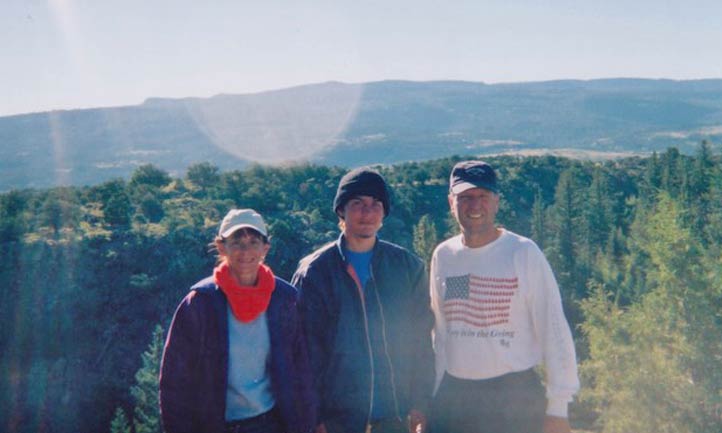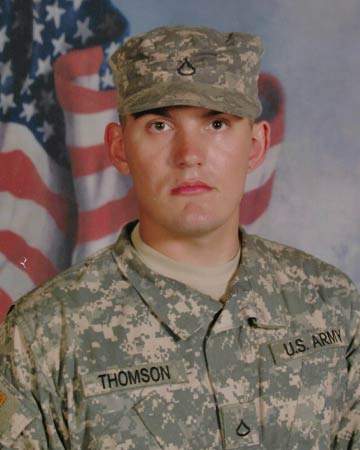A Mother’s Journey Through Writing
Author: Margaret Thomson
My son, Pfc. Kieran James Thomson, took his life on August 28, 2010, three months before he was due to deploy to Afghanistan for the first time. Kieran was 22 years old at the time with a wife and a 2-year-old daughter.
Despite being overwhelmed by grief, after several months I hesitantly began writing about my older son. I say hesitantly because I wasn’t at all sure whether formulating words and putting them down on paper or in the computer would even be possible.
As a lifelong journalist, writing was—and still is—my way of making sense of the world. Even during this, the most difficult time of my life, the act of at least trying to write, as best I could, suddenly became a lifeline. Even in the midst of paralyzing grief, I wrote.


I wanted to write as a way of capturing a sense of who Kieran was, even if only for myself. I wrote without a thought as to whether anyone else would ever read what I was writing. I wrote about Kieran’s joy the day he graduated from basic training, his kindness towards others, his love for his daughter and his wife. I also wrote in an effort to find out why he’d done what he did, even though I knew that finding a definitive answer was highly unlikely.
Still, I remained determined to plumb as many events from his life as I could remember, including even the most painful, for meaning. Meaning that hopefully others could eventually relate to. I wanted to believe that my son had neither lived—nor died—in vain.

Kieran excelled in the Army. After making an almost-perfect score on the Army entrance exam, he called to tell me, with great excitement, that he’d been put on a fast track to becoming a medic. The responsibilities that went along with his assigned specialty helped to boost his self-esteem, which until then had been rather low, partly because of his less-than-stellar performance in high school. (Although highly intelligent and extremely well read, Kieran had routinely chaffed at the constraints of being in an academic setting.)
Several of Kieran’s fellow unit members would eventually tell me that my son had helped them, as well as others who were struggling, with mastering the skills they needed to know in order to become fully qualified medics. My intense grief notwithstanding, I found myself practically bursting with pride during the unit memorial upon hearing Kieran described as the “go-to medic.” Other remarks during the service confirmed what I already knew, which was that my son had matured tremendously during his 18 months in the Army. No longer a quirky, even rather immature, young man, he’d been transformed, largely thanks to the Army, into a responsible, even highly respected, adult.
In November 2010, only weeks before his unit deployed, my husband and I traveled to Fort Bragg, where Kieran had been stationed, to meet with a number of his friends and fellow soldiers. More than a dozen turned up to talk for more than two hours about our son. They talked about how he was bright, even brilliant, and about how he taught them all an incredible amount about poetry and music and literature. They also talked about how, even though he took his job as a medic extremely seriously, he was always the first to crack a joke at exactly the right moment in an effort to relieve the day-to-day pressures of preparing for deployment.
Later, I wrote down every detail of that meeting, from the intensely painful to the seemingly trivial, since I was almost as afraid of forgetting what I’d heard as I was of others forgetting my son.
Again, writing was the only thing I could think of to do. For me, it was the only thing that felt right. Had I been an artist or a musician I might have painted something or written a song. Who knows? It’s certainly possible that activities such as these might have been more satisfying than attempting to write. Or maybe journaling would have been more helpful, as well as a lot less stressful. But then I’ve never really been the sort of person who journals. Instead, the manner in which I chose to write was a lot like reporting a news story. Perhaps because it was what I was used to, this sort of writing felt “safer” than anything else.
Following Kieran’s death, I knew that there was no way I could ever go back to being the person I’d been before. This was one of the reasons I wanted to write. I suspected that the journey I’d only recently embarked upon was going to be a long and arduous one, and I wanted to document how I—as well as others—would undoubtedly change over the months, and even years, to come.
And so I just kept on writing, filling up three-ring binders—and even the computer—with words. (It definitely takes a lot of words to fill up a computer!) I rarely used those fancy little notebooks of the type often bound in either beautiful fabric or handsome leather. These kinds of notebooks have always seemed to me to be much too attractive—and expensive—especially given the fact that my handwriting is so poor as to be almost indecipherable. (If you have poor handwriting, writing in a fancy notebook has never really made sense to me.)
Subconsciously, I believe that writing helped me to do what therapists often say that survivors must do—which is to tell your story as a way of integrating it into who you are, as well as who you’re in the process of becoming. And you don’t simply tell your story once and then you’re done. Instead, therapists often recommend that you tell it repeatedly (even if only to a friend or other nonprofessional) as a way of coming to terms with your loss while also hopefully finding a measure of peace.
It took many years, but finally I found that peace, in part because of the writing I’d done. And while the path I chose definitely isn’t for everyone, for me it’s been a healthy, as well as a healing, journey.
Kieran had always wanted me to write a memoir about my experiences as a journalist. The World Looks Different Now is not that book. Nevertheless, I feel certain that my son would have been proud of me for writing it.

Margaret Thomson is a journalist who worked in London for 12 years. During this time she reported on a variety of subjects, from wars in the Middle East to the British royal family. Upon returning to Tennessee, she has continued to write for a number of print and online publications. She is the surviving mother of Pfc. Kieran Thomson. Her book, “The World Looks Different Now” will be published by She Writes Press in July 2020.
Photos courtesy of Maragaret Thomson
